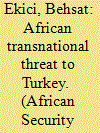|
|
|
Sort Order |
|
|
|
Items / Page
|
|
|
|
|
|
|
| Srl | Item |
| 1 |
ID:
132531


|
|
|
|
|
| Publication |
2014.
|
| Summary/Abstract |
Afghanistan has been the global epicenter of heroin production for the past decade. Heroin networks and drug lords present a principal impediment to security, state building, and democratic governance. Beyond the national boundaries, Afghan-originated heroin creates enormous challenges for international security by financing terrorism, instigating corruption, killing nearly 100,000 users worldwide every year, undermining public order, and debilitating economic development. The devastating impacts of the Afghan heroin trade have spilled over into Southwest Asia, Central Asia, Russia, China, the Balkans, and Europe. Because Turkey stands on the shortest transit pathway between Southwest Asia and Europe, it is intensively exposed to illicit flows of Afghan heroin along the Balkan Route. Transnational crime syndicates have been exploiting Turkish territories for decades for the purpose of trafficking heroin to European markets. This paper discusses Afghan heroin as an international security conundrum. It further seeks to explore the dimensions of the threat in Turkey, new patterns in heroin trafficking, and profiles and operation modes of transnational syndicates. The analyses are based upon the scrutiny of important case files, national seizure database, and annual KOM provincial questionnaires. In conclusion, the paper puts forward policy recommendations for security elites both in Turkey and in other states affected by the illicit trade of Afghan heroin.
|
|
|
|
|
|
|
|
|
|
|
|
|
|
|
|
| 2 |
ID:
123456


|
|
|
|
|
| Publication |
2013.
|
| Summary/Abstract |
Africa has emerged as a strategic location for transcontinental narcotics trade. Particularly the West African subcontinent has turned into a cocaine warehousing and trans-shipment hub along the way to the European underground markets. At this juncture, African drug networks (ADNs) began to play a momentous role in global drug trade, and pose a considerable threat to international security, as they operate in more than 80 countries. The United Nations Office on Drugs and Crime, Interpol, and Europol perceive ADNs as one of the primary issues in international counter-narcotics policy. These agencies have launched several multilateral initiatives to contain the West African threat. None of these initiatives, however, retarded the expansion of the problem. Indeed, the containment efforts turned out to be quite embryonic. The ADNs eventually entered the Turkish market by the early 2000s. West African drug networks (WADNs) in particular have begun to operate within Turkey extensively, often supplying and distributing drugs. The gravity of the threat became ever more serious by 2012. The upsurge of the new threat has compelled the Turkish drug-law enforcement agencies to adopt new policies and counter-strategies. These policies have to be based upon proper strategic analysis of the threat. This paper seeks to address the need for a threat assessment of ADNs. It investigates the dimensions of the problem, profiles the members of WADNs, their modes of operation, and the factors that compelled them to exploit the illicit Turkish drug markets. The analyses are based upon the scrutiny of 227 narcotic interdictions files and statements from the African individuals in these case files. The paper concludes by presenting policy implications and recommendations for the Turkish security and foreign-policy institutions to cope with this impending threat.
|
|
|
|
|
|
|
|
|
|
|
|
|
|
|
|
|
|
|
|
|